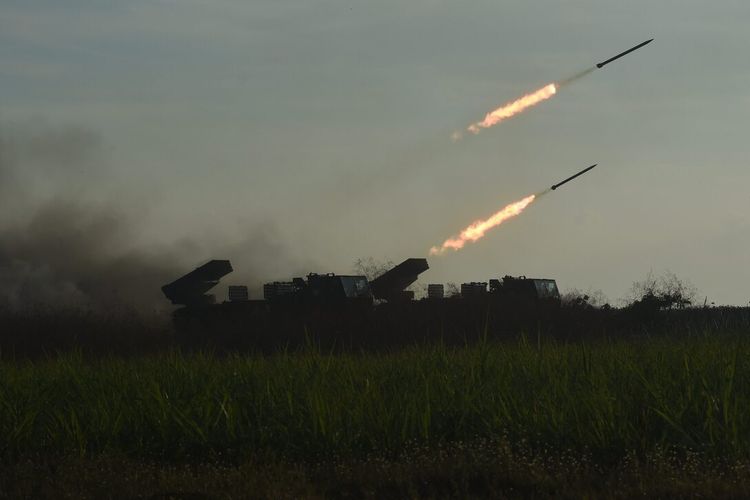War Exercise, Indonesia's Geopolitical and Geostrategic Needs to Face Threats

Shooting of an RM-70 MLRS Vampire Rocket at Banongan Beach to carry out an amphibious operation during the 2023 Dharma Yudha TNI Joint Exercise in Situbondo, East Java, Tuesday (1/8/2023). At the peak of the joint ground operation exercise, amphibious operations, combat support support operations, joint air operations and airborne operations were carried out. The operations center is at viewing point T12 of the Marine Combat Training Center 5 Baluran. Kompas/Bahana Patria Gupta (BAH)(Bahana Patria Gupta/KOMPAS)
Enemy troops who were off guard were infiltrated by TNI (Indonesian National Armed Forces) special forces, such as Unit 81 Kopassus (Special Forces Command), Denjaka (Jalamangkara Detachment), Yon Taifib (Amphibious Reconnaissance Battalion), and Kopasgat (Rapid Action Troops Command), who moved in the night to destroy enemy strategic targets.
After the infiltration of special forces, elements of the Joint Sea Task Command (Kogaslagab) and Joint Air Task Command (Kogasudgab) bombarded the enemy coast with the help of fire from the air and sea.
Then an amphibious operation was carried out with marines landing from the sea to control the enemy coast. After the coast was controlled, joint land forces were deployed to carry out further land operations.
That is the reality of the 2023 TNI Joint Exercise with the title Dharma Yudha. The battlefield exercises which took place from 30 July to 1 August 2023 involved 7,165 soldiers, 35 Republic of Indonesia warships (KRI), 20 combat aircraft, 15 helicopters, 15 land tanks and 43 amphibious tanks.
Indonesia is ready to face threats
The TNI 2023 Joint War Exercise has significant benefits – when it is viewed from a geopolitical and geostrategic perspective. The battlefield drills allow Indonesia to increase its defense capabilities.
In a complex and often unstable world, Indonesia must be prepared to face various threats and security challenges.
So through these battlefield exercises, Indonesia can improve its military readiness and skills, as well as strengthen its ability to protect its territory and national interests.
On the other hand, it also functions as a signal of deterrence against potential enemies. When countries demonstrate strong military capabilities through battlefield exercises, they can prevent aggressive actions from other countries that might try to threaten their security or sovereignty. Indonesia indirectly shows these things.
At the same time, these battlefield exercises provide an opportunity to test and evaluate military strategy.
From this exercise, countries can identify weaknesses and strengths in the plans and tactics used.
This allows adjustments and refinement of strategies that are more effective in dealing with potential future threats.
Apart from the strategic aspect, the battlefield exercises also provide an opportunity for military personnel to improve their operational skills.
Realistic –and intense– battlefield exercises can enhance quick reaction, coordination, and combat skills that are vital in real situations.
The 2023 TNI Joint Exercise entitled Dharma Yudha was successful and effective, thereby strengthening the country’s international image and influence.
So Indonesia demonstrated a reliable and professional military capability that received a positive response from the international community – and won the trust of potential partners.
Overall, joint war exercises are an important instrument to help nations and states prepare to face various geopolitical and geostrategic challenges, as well as ensuring national security, stability and sovereignty.
Increasing defense capabilities
In a geopolitical and geostrategic context, Indonesia is holding battlefield exercises to strengthen national defense, increase military readiness, and strengthen its position in the geopolitical region of Southeast Asia and the Pacific Ocean.
As an archipelagic country with a vast sea area, exercising helps Indonesia to face maritime security challenges.
The exercise includes strengthening the navy and aviation to control national waters, protect natural resources and prevent threats to maritime sovereignty.
And through these transparent battlefield exercise, Indonesia can strengthen regional stability. And can increase cooperation with neighboring countries to maintain peace and security in the Southeast Asia region.
The 2023 TNI Joint Exercise also functions as a deterrence measure against potential threats. By demonstrating strong military readiness and capabilities, Indonesia can effectively signal that this country is prepared to face any potential external threats.
Another thing is to help increase military capabilities and professionalism of the Indonesian armed forces. Military personnel can improve operational, coordination and tactical skills that are essential in maintaining national sovereignty and security.
Thus, the battlefield exercises carried out by Indonesia have a strategic objective to strengthen national sovereignty, defense and security, as well as to play a stronger role in geopolitical and geostrategic dynamics in the Southeast Asia and Pacific Ocean regions.
Geopolitical and Geostrategic Needs
Geopolitical and geostrategic needs are very important in assessing battlefield exercises. Geopolitics and geostrategy are the study of the interaction between geographical, political, economic and military factors in determining a country’s policies and strategies at regional and global levels.
In the context of battlefield exercises, these two aspects are the main considerations in planning, implementing and evaluating state military exercises.
So geopolitics and geostrategy consider that effective war training must prepare armed forces to face various potential threats and secure national sovereignty.
So geopolitics and geostrategy also consider: the extent to which battlefield exercises can increase military readiness to deal with threats that may arise at the regional or global level.
This should cover realistic and diverse scenarios, including both traditional and non-traditional threats.
Apart from that, geopolitics and geostrategy also consider that another important aspect is the extent to which battlefield exercises can help improve operational skills, quick reactions and coordination between various military forces.
In the end, geopolitical and geostrategic needs become important guides in assessing a country’s battlefield exercises.
Effective military exercises must accommodate the above aspects, to ensure that the country is ready and able to face various security challenges that exist at regional and global levels.
(Prof. DR. Drs. Ermaya Suradinata, SH, MH, MSI, adalah mantan Dirjen Sospol Depdagri RI, Rektor IPDN, Gubernur Lemhannas RI, dan saat ini Dewan Pakar Bidang Geopolitik dan Geostrategi BPIP RI.)
